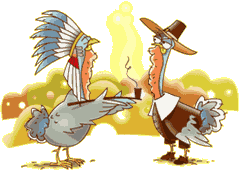Like many of you, Dawn and I will be enjoying Thanksgiving dinner with family. But this year, with our house still under renovation and with the size of our family, we collectively decided that, this year, we should let someone else cook the turkey - and do the dishes! So we’ll be among the thousands of families that, for one reason or another, will be enjoying Thanksgiving dinner at a restaurant.
Oh, I know, it’s not the same as sitting around your own dinner table and saying, “Pass the gravy.” But, except for Dawn and I, none of our family have a table that can accommodate all thirteen of us. And this year, we’ll have three additional guests! So we’ve picked a nice restaurant we know will do a first rate job and, when we’ve all eaten our fill, we’ll just push away from the table… and leave the cleanup to someone else.
Of course, the best part of the holiday for us, besides the magnificent dinner table, is having my family together. We’ll miss James this year - he’ll be celebrating with Liz and her family - but there’s always something wonderful about having family come together, give thanks and share a fine meal. I love the family part the most.
Lori introduced a new family tradition a couple years ago where we all wrote down the things we were thankful for during the year to be read aloud at the dinner table the following year. I doubt the setting this year will be conducive, but I hope we do it next year. It’s a great tradition! Dawn and I have so much to be thankful for and making “Thanks” part of our Thanksgiving is what it’s all about. And a great way to begin is to remember how it all began.
The first Thanksgiving in Plymouth, Massachusetts, starred the Pilgrims, Squanto and the friendly Wampanoag tribe led by Massasoit, who celebrated a bountiful harvest and the promise of making it through the harsh New England winter. Here are some lesser-known facts about that first Thanksgiving in 1621:
 Squanto was a Patuxet Indian who almost single-handedly saved the first Pilgrims from starving to death. He taught them how to catch eels and trap fish during their spring run, plant corn and pumpkins and trap beavers. He helped the Pilgrims despite having been captured and sold into slavery by an English sea captain. According to Peter Marshall and David Manuel in The Light and the Glory, Squanto was shipped to Malaga, Spain, where he was rescued by local friars, and eventually returned to Plymouth, where he discovered not one member of his tribe was left alive.
Squanto was a Patuxet Indian who almost single-handedly saved the first Pilgrims from starving to death. He taught them how to catch eels and trap fish during their spring run, plant corn and pumpkins and trap beavers. He helped the Pilgrims despite having been captured and sold into slavery by an English sea captain. According to Peter Marshall and David Manuel in The Light and the Glory, Squanto was shipped to Malaga, Spain, where he was rescued by local friars, and eventually returned to Plymouth, where he discovered not one member of his tribe was left alive.
During that first Thanksgiving celebration, the Wampanoags brought to the feast fat wild turkeys and introduced the Pilgrims to a local delicacy called popcorn. Next time you enjoy some at the movies, thank the Wampanoags, not Orville Reddenbacher.
They celebrated that first Thanksgiving in October, not November. In 1941, Congress issued a national proclamation setting our observance of Thanksgiving on the fourth Thursday of November.
During the winter of 1621-22, an influx of new settlers eventually forced the pilgrims to live on a daily ration of five kernels of corn a piece. At the next Thanksgiving, Marshall and Manuel noted, “the first course that was served ‘…on an empty plate in front of each person were five kernels of corn… lest anyone should forget.’”
We have a lot to be thankful for, as those first pilgrims did. And for all its faults, we live in a country where we can write, speak and worship freely, and where we can attempt to right wrongs without being thrown in jail or exiled. Solomon wrote, “Where there is no vision, the people perish.” Well, where there is no thankfulness, people sour, slowly, like leftover cranberry sauce. We need Thanksgiving, if for no other reason than to remember that while there may be only five kernels of corn on our plate, there are still five, and that the promise of harvest is only a season or two away.